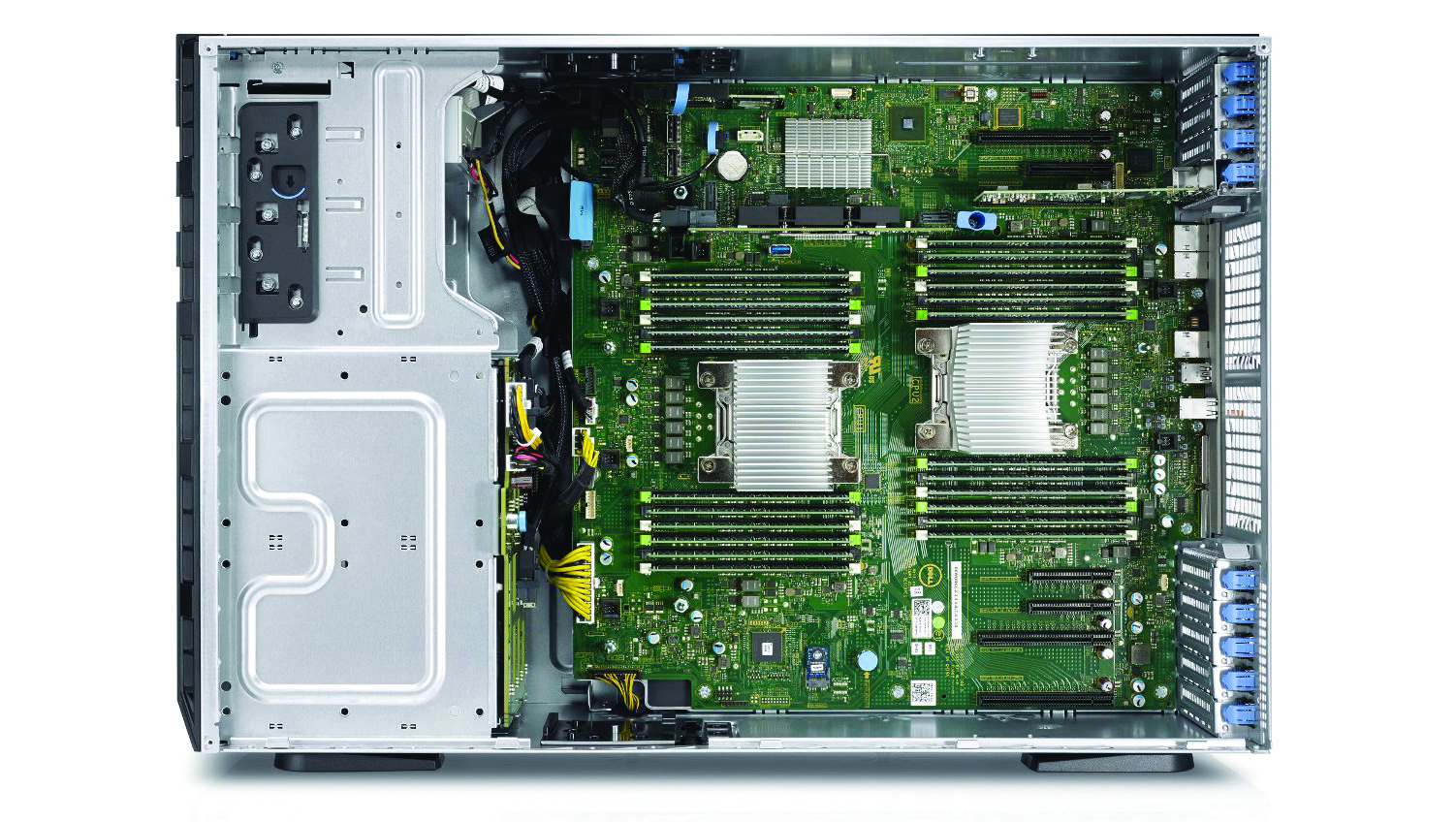Dell PowerEdge T630 review
It’s pricey, but this classy tower server is capable of handling anything your business might throw at it

The PowerEdge T630 is an absolute beast, but if you can afford the expense, it can handle plenty of heavy lifting.
-
+
Huge storage capacity; Good expansion options
-
-
Very expensive

Everything about Dell's mighty PowerEdge T630 exudes quality. The industrial-strength chassis, huge expansion potential and massive capacity mark this out as a server that can go where others fear to tread.
One particular strength is storage capacity. We were supplied with the 32 SFF version, but you can opt for the 18 LFF model instead; Dell also offers a single 16 SFF model, andthe T630 can handle up to four PCI Express SSDs that can be mixed with eight LFF or 16 SFF drive bays.
RAID choices begin with the embedded PERC S130, which can handle up to eight hot-swap SATA drives with software-managed RAID0, 1 and 5 arrays. We testedthe top PERC H730P RAID card, which ups support to 12Gbits/sec SAS drives and offers a hefty 2GB of battery- protected DDR3 cache.
SSD caching is available too, but Dell has dropped LSI's embedded CacheCade feature. Costing around 265, the SanDisk DAS Cache option is now implemented as an OS driver, managed via an MMC snap-in and supporting read and write caching.
The T630 also has one of the biggest memory capacities in town, with 24 DIMM slots supporting up to 768GB of DDR4. Power is versatile: alongside the dual 750W Platinum PSUs in our review system, Dell offers 495W, 1,100W and 1,600W Platinum, 750W Titanium or 1,100W DC versions, all sharing a common form factor.
On the CPU front, our system was supplied with a pair of 14-core 2.3GHz E5-2695 v3 Xeons a hefty duo that accounts for a large portion of the total price. With their 120W TDP, these proved rather thirsty: we measured the system pulling a reasonable 120W in idle but peaking at 390W under maximum load. You can reduce this by choosing from a wide selection of lower-TDP CPUs, which will cut the cost as well: stepping down to more mainstream 10-core 2.3GHz E5-2650 v3 Xeons will save you nearly 2,500.
Even with high-end processors, the PowerEdge T630 gets away with only two hot-plug fans at the rear of theair shroud, making the unit whisper quiet. If you want fan redundancy, you'll need the optional four-fan module; this is also required if you want to use 18 LFF drives, or to install graphics cards or PCI Express SSDs.
The spacious interior of the case offers plenty of room for upgrades. The RAID card is neatly tucked away at the top of the motherboard, and there's a slot above this for Dell's dual SD card controller, which adds hypervisor redundancy by mirroring them in hardware. Seven PCI Express slots offer plenty of room for more network ports, should the standard dual Gigabit Ethernet not satisfy.
Dell's iDRAC8 controller gets its own Gigabit port, too, offering an informative interface that also provides direct access to the RAID card for storage configuration. Dell's OpenManage Essentials provides agent-free monitoring for SNMP and WMI-based devices, along with network discovery and inventory. Usefully, it links up with any iDRAC card to provide monitoring and alerting for multiple servers from one console.
The top E5-2600 v3 Xeons certainly push up the price, but then the Dell PowerEdge T630 is a big server for big jobs. You can tailor it to suit a budget, but its natural constituency is businesses that need plenty of power, masses of storage and room to grow.
This review first appeared in PC Pro magazine issue 250
Verdict
The PowerEdge T630 is an absolute beast, but if you can afford the expense, it can handle plenty of heavy lifting.
Tower chassis
2 x 2.3GHz Intel Xeon E5-2695 v3
64GB 2,133MHz DDR4 1.2V (max 768GB)
2 x 300 GB SAS 10K SFF hard disks (max 32)
Dell PERC H730P 12Gbits/sec SAS/ 2GB cache/BBU (supports RAID0, 1, 10, 5, 6, 50, 60)
7 x PCI-E (with 2 CPUs)
2 x Gigabit Ethernet
2 x 750W Platinum hot-swap PSUs
Dell iDRAC 8 Enterprise
220 x 700 x 443mm (WDH)
3yr on-site NBD warranty
Get the ITPro daily newsletter
Sign up today and you will receive a free copy of our Future Focus 2025 report - the leading guidance on AI, cybersecurity and other IT challenges as per 700+ senior executives
Dave is an IT consultant and freelance journalist specialising in hands-on reviews of computer networking products covering all market sectors from small businesses to enterprises. Founder of Binary Testing Ltd – the UK’s premier independent network testing laboratory - Dave has over 45 years of experience in the IT industry.
Dave has produced many thousands of in-depth business networking product reviews from his lab which have been reproduced globally. Writing for ITPro and its sister title, PC Pro, he covers all areas of business IT infrastructure, including servers, storage, network security, data protection, cloud, infrastructure and services.
-
 Nvidia braces for a $5.5 billion hit as tariffs reach the semiconductor industry
Nvidia braces for a $5.5 billion hit as tariffs reach the semiconductor industryNews The chipmaker says its H20 chips need a special license as its share price plummets
By Bobby Hellard Published
-
 Business leaders are having a crisis of confidence over data literacy
Business leaders are having a crisis of confidence over data literacyNews A Salesforce survey reveals business leaders don't trust their data, or their ability to make the most of it
By Emma Woollacott Published
-
 MITRE CVE program handed last minute reprieve amid funding lapse concerns
MITRE CVE program handed last minute reprieve amid funding lapse concernsNews The MITRE Corporation's Common Vulnerabilities and Exposures (CVEs) database has been handed a last minute reprieve amid concerns over funding.
By Rory Bathgate Last updated